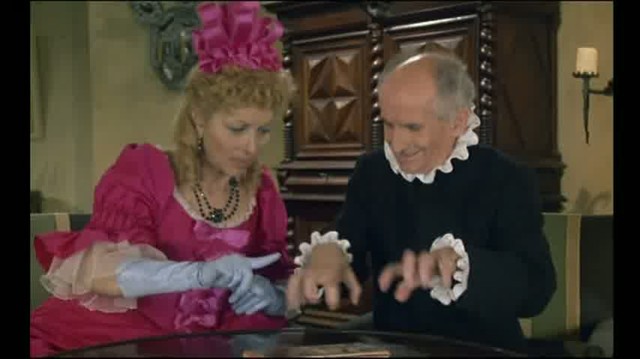Photographie:
Edmond RichardMusique:
Jean BizetActeurs·trices:
Louis de Funès, Claude Gensac, Michel Galabru, Annie Cordy, Guy Grosso, Michel Modo, Henri Génès, Madeleine Barbulée, Micheline Bourday (plus)VOD (3)
Résumés(1)
Harpagon (Louis de Funès) est, avant tout et par dessus tout, un avare. Cette passion aveugle et dévastatrice le rend insensible à tout autre sentiment humain. Harpagon a une fille, Elise, qui est très éprise du jeune Valère, lequel s'est fait engager comme majordome chez l'Avare. Ce dernier a aussi un fils, Cléante, qui est amoureux de Marianne, une jeune fille sans fortune. Or Harpagon veut épouser Marianne, ce qui n'arrange pas ses rapports avec son fils qui, déjà, sont empoisonnés par une querelle d'argent : Cléante a emprunté à un taux exhorbitant à un usurier qui s'avère etre... Harpagon lui-meme. Pour faire sa cour à Marianne, l'Avare l'invite à diner tout en demandant à ses domestiques de limiter les frais. Peu après, il apprend, de la bouche meme de son fils, les doux liens qui l'unissent à Marianne. Harpagon est fou de rage, et sa colère redouble quand il apprend qu'un trésor enfoui dans le jardin lui a été dérobé. il appelle la police, on interroge Maitre Jacques, un domestique, qui, pour se venger, accuse l'intendant Valère. On en est là quand arrive le seigneur Anselme que l'on croyait disparu, et celui-ci reconnait Valère et Marianne comme étant ses enfants. Tout s'arrange car le riche Anselme accepte de prendre en charge les frais des mariages et, surtout, quand La Flèche, qui est au service de Cléante, fait ré-apparaitre la cassette qu'il avait dérobée pour aider son maitre. (AMLF)
(plus)Critiques (2)
Unlike other people, I don't think Louis de Funès looks tired as Harpagon, quite the opposite. I was amazed how vital he was, how he was always running from somewhere, hitting someone or throwing something at someone, throwing his arms around, screaming angrily and then whining innocently again... Just admirable form, say what you will. It's a pity that The Miser hasn't got rid of the biggest malady it has suffered from since Molière wrote it, namely the stretchiness. The film masks it quite successfully, apart from Funès' rampage, with some really great scenes with Claude Gensac and Michel Galabru, but at times (especially in the end) it drags and there is nothing to be done about it.
()
I simply didn't like this performance. Louis de Funès is classically affected and theatrical, and it just doesn't suit the character. He is always the one who wants to be in the center of attention, who wants to be incredibly interesting and entertaining, but his acting is simply annoying in this case. The play itself is good, but what really impressed me in this adaptation were the drawings by Albert Uderzo.
()

